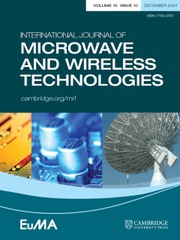Segmented quarter cylindrical dielectric resonator antenna: simulation and experimental investigation in composite form for wideband applications
Published online by Cambridge University Press: 06 June 2016
Abstract
A probe feed wideband multi-element dual segments quarter cylindrical dielectric resonator antenna (q-CDRA) in composite forms have been proposed. The q-CDRA has been introduced by splitting CDRA into four uniform quarters and multi-segmentation approach has been castoff for further improvement in bandwidth of q-CDRA. The dual segments q-CDRA has been designed and analyzed using theoretical analysis and Ansoft HFSS simulation software. Further the dual segment multi-element q-CDRAs in composite form have been designed. A coaxial probe has been placed at the center of the ground plane for the excitation of proposed multi-element and multi-segmented composite form of q-CDRA, which excite TM01δ mode in the proposed antenna. The input characteristics and radiation patterns of the proposed composite antennas have been studied and their results are compared with corresponding experimental results. Prototype of single, two, and four elements dual-segment composite q-CDRAs have been fabricated and input characteristics of the proposed composite antennas have been compared with each other. Four elements dual-segment composite q-CDRA has shown wide impedance bandwidth (|S11| ≤ −10 dB) of 85.13% with monopole-like radiation pattern. The peak gain of 4.85 dBi with 98.5% radiation efficiency has been achieved for dual-segment four elements composite q-CDRA. The proposed multi-element dual-segment composite q-CDRAs may find suitable applications in C and X-band with complete covering of the 5.0 GHZ wireless local area network (WLAN) and worldwide interoperability for microwave access (WiMAX) band.
Keywords
- Type
- Research Papers
- Information
- International Journal of Microwave and Wireless Technologies , Volume 9 , Issue 4 , May 2017 , pp. 881 - 890
- Copyright
- Copyright © Cambridge University Press and the European Microwave Association 2016
References
REFERENCES
- 2
- Cited by


